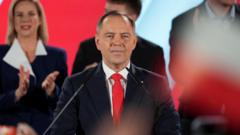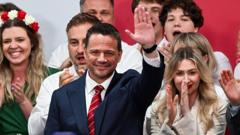As Poland's presidential election draws to a close, the race between Rafal Trzaskowski and Karol Nawrocki has reached a tension-filled climax, with both candidates claiming victory and the outcome hanging in the balance.
Poland's Presidential Race: Closer Than Ever

Poland's Presidential Race: Closer Than Ever
Tight contest signifies a pivotal moment for Poland’s political landscape amid rising nationalism in Europe.
A crucial presidential election event unfolded in Poland on Sunday, where voters turned out in significant numbers, leading to an unprecedented level of voter engagement. The final tallies from exit polls indicate that liberal candidate Rafal Trzaskowski, the current mayor of Warsaw, slightly edged out his rival, Karol Nawrocki, a nationalist historian and a member of the right-leaning Law and Justice party. With early reports showing Trzaskowski at 50.3% and Nawrocki at 49.7%, the race remains too close to call as official results begin to roll in.
In a passionate address to his supporters, Trzaskowski prematurely declared victory, exclaiming, "Dear ladies and gentlemen — we won!” He stressed the significance of the tight race, suggesting this "razor-thin victory" would become a widely noted phrase in Polish discourse. In contrast, Nawrocki remained defiant, assuring his backers that the ultimate outcome would favor him, claiming, "Tonight we will win and save Poland."
The election has attracted passionate voter turnout, recorded at a remarkable 72.8%, the highest since Poland embraced democratic elections in 1990. The atmosphere surrounding the contest has underscored its importance as a gauge for the future of populism and nationalism in Europe.
On a broader scale, the election reflects Poland's stark political division. Voters are choosing not just between two candidates but also between two distinct visions for the country’s future. Should Trzaskowski prevail, his leadership could signal a shift towards collaboration with the centrist government led by Prime Minister Donald Tusk, potentially bridging the political discord that has persisted since Law and Justice lost its parliamentary majority in 2023.
In contrast, a Nawrocki win could solidify the existing political impasse, which has seen outgoing President Andrzej Duda exercise veto powers that hampered Tusk's administration's legislative goals. As the nation awaits the official results, the implications of the election will resonate well beyond Poland, prompting reflections on the potency of nationalism in shaping the continent’s political identity.





















